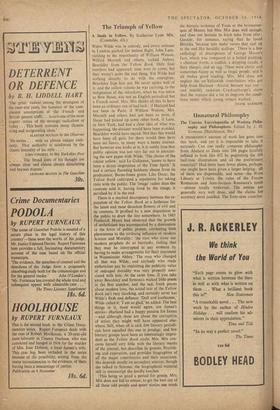The Triumph of Yellow
A Study in Yellow. By Katherine Lyon Mix. (Constable, 42s.) A Study in Yellow. By Katherine Lyon Mix. (Constable, 42s.) WHEN Wilde was in custody, and every suitcase in London packed for instant flight, John Lane, yielding to the importunity of William Watson, Wilfrid Meynell and others, sacked Aubrey Beardsley from the Yellow Book. Only four numbers had appeared; nine were to come, but they weren't quite the real thing. Yet Wilde had nothing directly to do with the enterprise; Beardsley kept him out. He never spoke well of it; and the yellow volume he was carrying, to the indignation of the onlookers, when he was taken to Bow Street, was not an English periodical but a French novel. Mrs. Mix thinks all this to have been an ordinary run of bad luck : if Harland had not been in Paris, if William Watson, Mrs. Meynell and others had not been so prim, if Oscar had picked up some other book, if Lane. in New York, had had a clear idea of what was happening, the disaster would have been avoided, Beardsley would have stayed. Not that this would have been all gain, for there would then have been no Savoy, in many ways a better journal. But however one looks at it, it is surely true that public opinion was not very far out in associat- ing the new paper with Wilde. 'The choice of the colour yellow,' said Le Gallienne, 'seems to have been a direct inspiration of the Time Spirit.' It had a certain flaunting boldness absent from its predecessor, Burne-Jones green. Like Oscar, the Yellow Book cultivated a reputation for taking risks with the public. The 'image' rather than the contents sold it; having lived by the image, it perished by it in the end.
There is a marked discrepancy between the re- putation of the Yellow Book as a hothouse for the latest and most decadent flowers of evil and its contents. It profited by a new disposition in the public to draw the line somewhere. In 1883 Frederick Myers had observed that the growth of aestheticism was accompanied by a diminution in the force of public protest, attributing both phenomena to the civilising influence of modern Science and Morality : 'the men who stone our modern prophets do so hurriedly, feeling that they may be interrupted at any moment by having to make arrangements for their interment in Westminster Abbey.' The man who changed all that was Wilde, and anybody who made aestheticism pay by exploiting the publicity value of outraged morality was very properly asso- ciated with him. At the same time, if you take away Beardsley and Symons's wicked little poem in the first number, and the sad, frank pieces about modern love, the actual text of the Yellow Book isn't very shocking, and certainly never has Wilde's flash and defiance. 'Dull and loathsome,' Wilde called it; 'I am so glad,' he added. The best things in it, most would agree, are James's stories—Harland had a happy passion for James —and although these are about the corruption of artists they might well have appeared else- where. Still, when all is said, few literary periodi- cals have equalled this one in prestige; and few literary groups have been so interestingly impru- dent as the Yellow Book circle. Mrs. Mix con- cerns herself very little with the literary merits of the journal, but describes its genesis, flourish- ing and expiration, and provides biographies of all the major contributors and their associates. She depends mostly on secondary sources, though she talked to Symons; the biographical material still in manuscript she hardly touches.
This being so good a period for gossip, Mrs. Mix does not fail to amuse; to get the best out of all these odd people and queer stories one needs the hieratic archness of Yeats or the boisterous- ness of Moore, but Mrs. Mix does well enough, and does not hesitate to fetch tales from afar: Gautier, for instance, saying that he loved Hdrddia 'because you make verses that curl up at the end like heraldic scallops.' There is a fine anthology of descriptions of George Moore's face, which was compared to a boiled pudding. a chestnut worm, a codfish, a dripping candle, a fiery sheep's, and an egg. These were clever and sometimes funny as well as tragic people. and it all makes good reading. Mrs. Mix does not neglect the un-Yellowish contributors who got help from Harland- -Arnold Bennett was one— and sensibly endorses Crackanthorpe's claim that the venture did a lot to improve the condi- tions under which young writers worked.
FRANK ERMODE






































 Previous page
Previous page